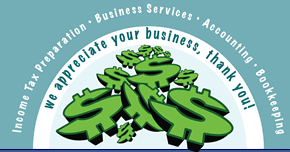| Home | Individual Services | Small Business | About | Contact | Tax Tips | Resources |
IRS TAX Calendar
Tax RulesTax rules can be very complex. Please do not hesitate to talk to me if you will be facing any of these situations:
|
Tax TipsLoretta's Tax TipsRead the Current Newsletter for information on these topics:
File and Pay Taxes Due On TimeOne major misstep many new business owners make is not adequately budgeting for taxes due. If you can’t pay the full amount, it’s important to at least file your tax forms by their due dates. If you cannot pay all your taxes immediately, pay as much as you can now. By filing on time and by paying what you can, you will reduce the amount of interest and penalty you will owe. You may be able to make monthly payments through an installment agreement. The IRS can set up a direct debit from your financial institution or a payroll deduction from your wages or salary. Your tax accountant can help you set up a payment schedule or installment. Note: In general, the penalty rate is ½ of 1 percent (.5 percent) each month tax is paid late. The penalty rate may increase to 1 percent, or the rate may decrease to ¼ of 1 percent (.25 percent) while an approved Installment Agreement is in effect. Regardless of the penalty rate, the total penalty cannot exceed 25 percent. However, you must have filed the tax return on time. ESTIMATED TAX PAYMENTS:
SELF-EMPLOYED INDIVIDUALS If you do not pay enough through withholding or estimated tax payments, you may be charged a penalty. If you do not pay enough by the due date of each payment period you may be charged a penalty even if you are due a refund when you file your tax return. For estimated tax purposes, the year is divided into four payment periods. Each period has a specific payment due date. Using the EFTPS system is the easiest way to pay your federal taxes— for individuals, as well as businesses. Make ALL of your federal tax payments including federal tax deposits (FTDs), installment agreement, and estimated tax payments using Electronic Federal Tax Payment System (EFTPS). PENALTIES
|

